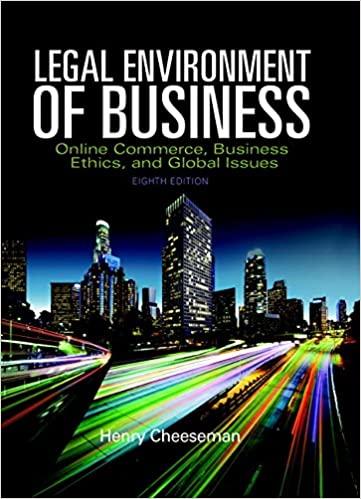Answered step by step
Verified Expert Solution
Question
1 Approved Answer
Question B. Recreational use of marijuana (the least potent of all the cannabis products, often smoked in hand-rolled cigarettes) should/should not be legalised (i.e. sold
Question B. Recreational use of marijuana (the least potent of all the cannabis products, often smoked in hand-rolled cigarettes) should/should not be legalised (i.e. sold as a legal product, subject to some regulation, akin to alcohol, tobacco or pharmaceuticals) in Australia.
Some factual information to assist in building your argument in Question B
- Recreational use of marijuana will become legal in Canada from July 2018. In preparation for this, federal and provincial governments have tightened the rules around impaired driving and brought in a roadside saliva test to check for drug impairment. The federal government is setting up systems to track all cannabis from seed to sale, to license non-medical producers and to test marijuana for potency and quality control.
- The federal law regarding marijuana in the U.S. allows state legislators to decide for themselves whether to prohibit marijuana or not. In the 2016 Gallup poll, 60% of Americans supported regulating recreational cannabis. Starting from 2012 (Colorado), nine states in the U.S. made (or will make soon) recreational use of marijuana legal. The retail sales of cannabis for recreational use amount to about 4.4 billion U.S. dollars in 2018. This leads to the collection of huge taxes by the respective state government, a high proportion of which is directed to education. For example, California's recreational-pot industry will, when up and running, generate $1 billion/year in tax revenue.
- New Frontier Data: the cannabis industry will have created 283,422 jobs by 2020 in the US.
- NBC News and Reuters, Jan. 2018: Attorney General Jeff Sessions gave U.S. attorneys the green light to aggressively enforce federal laws against marijuana even in states where recreational use is legal. He famously said 'good people don't smoke marijuana' during a 2016 Senate hearing. The policy put in place under former President Obama had discouraged federal prosecutors from pursuing marijuana-related criminal cases in states that had legalized the drug. Jeff Sessions said in a recent statement that the Obama-era policy 'undermines the rule of law'.
- Daily Mail: Pope Francis has stated that legalising recreational drugs was 'highly questionable' and would 'fail to produce the desired effects'. He added that legalisation was 'a veiled means of surrendering to the problem'.
- Kevin Sabet, leading US academic, quoted in The Guardian: 'Legal regulation has been a disaster for drugs like alcohol and tobacco. Both of those drugs are now sold by highly commercialised industries who thrive off addiction for profit.... At a time when governments are uniting to stop people smoking, should they really be becoming more laissez-faire about drug use?'.
- Roy Morgan Research - survey 2014: The proportion of Australians who believe it should be made legal has grown from 26.8% (2004) to 31.8% (2014). The 65+ age bracket has seen the largest proportional increase in favour of legalisation, rising from 16.9% to 25.5%. Young Australians aged 18-24 (35.7%) are the age group with the most support for making smoking marijuana legal. The proportion who want it to remain illegal is declining. In 2004, 64.1% of the population thought smoking marijuana should remain illegal; by 2014, it sat at 56.8%.
- Politicians such as NSW Premier Mike Baird and Victorian Premier Daniel Andrews have expressed their support for legalising recreational use of cannabis. An Australian study of 18-29 year olds by the NSW Bureau of Crime Statistics and Research shows that Prohibition does indeed deter illicit drug use. 29% of those who had never used cannabis cited the illegality of the substance as their reason for never using the drug, while 19% of those who had ceased use of cannabis cited its illegality as their reason. 91% of those currently using cannabis weekly said they would use more cannabis if it were made legal.
- A study by Niveau & Dang titled 'Cannabis and Violent Crime' and published in a 2003 issue of Medicine, Science and the Law shows links between cannabis and violence (in addition to deaths from car accidents while intoxicated or violence and aggression while withdrawing).
Step by Step Solution
There are 3 Steps involved in it
Step: 1

Get Instant Access to Expert-Tailored Solutions
See step-by-step solutions with expert insights and AI powered tools for academic success
Step: 2

Step: 3

Ace Your Homework with AI
Get the answers you need in no time with our AI-driven, step-by-step assistance
Get Started


